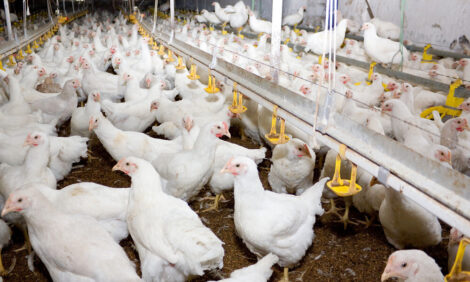



Not Only Ethanol to Blame for High Food Prices
US - Although ethanol has raised the demand for corn, it is not solely to blame for higher food prices, said US Secretary of Agriculture, Ed Schafer, during a visit to an innovative poultry plant.Omaha World Herald reported Mr Schafer's comments during a visit to MBA Poultry's Smart Chicken processing plant in Tecumseh, where about 60,000 chickens a day are slaughtered.
Kevin Siebert, company president and chief executive officer commented that his company, too, has felt the effects of higher corn prices in the form of increased feed costs for its birds.
Factors Driving up Food Prices
Mr Schafer said using corn to produce ethanol is only a minor factor among many that are driving up consumer food costs.
"The big factor in food prices is energy," he said. "Look at all the energy it takes to produce food, to run the tractors, to ship the products — that's the huge factor."
The growth in US food costs has doubled to about 5 per cent a year, compared with 2 per cent to 2.5 per cent in previous years, Mr Schafer said. Worldwide, food costs grew substantially more, he added.
About six weeks ago, US Department of Agriculture researchers analyzed the problem and reported that rising energy costs, decreased crop production around the world because of bad weather and increased worldwide consumption were among the factors contributing to higher food costs.
"That analysis found that ethanol and the increased use worldwide of other biofuels were both contributing factors but not major ones," Mr Schafer said.
"The USDA shared its report with Congress and invited board members of the Grocery Manufacturers Association — which has been critical of ethanol's impact on food prices — to discuss the findings. He said those invitations were declined.
"The grocers are targeting ethanol because they think they can change ethanol policy more easily than larger energy policy.
The Environmental Protection Agency is to decide soon whether to roll back the Renewable Fuels Standard, a federal mandate calling for the production of 9 billion gallons of biofuels in 2008 and larger amounts in the future."
New Plant Features Air Chilling and Controlled Atmosphere Stunning
Mr Schafer's visit to the Tecumseh facility was a part of a tour of four Nebraska meat-packing and processing facilities to highlight food safety measures and the USDA's Food Safety and Inspection Service.
The Tecumseh plant employs two unusual techniques in processing chicken.
Firstly, newly slaughtered and eviscerated chickens are hung and cooled to USDA-required temperatures in an air-chilled chamber instead of being immersed in chlorinated ice water — a more common technique in the US.
Second, the company uses a controlled atmosphere stunning system, in which birds are slowly rendered unconscious by moving through a carbon dioxide chamber before they are hung for slaughter.
"It eliminates the stress and some of the violence in the hanging and killing process," Mr Siebert explained of the carbon dioxide process.
"We're convinced it not only produces a more humane product but a better product."








